Mobile apps are the new front of business, enabling even a small business can reach millions of people. As a result, there are 3.553 million Android apps and 1.642 million iOS apps in the market.
The exciting part is, the number keeps growing as businesses across industries and niches plan to develop an app. And the first question that comes to mind is:
“How much does it cost to develop a mobile app?”
While on average, mobile app development costs range from $10,000 to $150,000 or more, it highly depends on the app type, complexity, feature set, and developers involved.
That’s why estimating application development costs becomes so difficult.
But worry not, in this step-by-step guide to app development cost, we shall be discussing everything you need to know about the same. Taking you from the app development budget template, the average cost to develop an app, the app cost examples to complete the breakdown, hidden costs, and tips to reduce app cost.
Whether you are planning to develop an app for a startup or extend your business to the digital realm via a mobile application, by the end of the blog, you’ll know everything concerning finances involved in app development.
Average Mobile App Development Cost
So, how much does it cost to build an app?
The average cost to develop an app starts from $10,000 and goes up to $150,000 or more depending on various factors like app feature, platform, and type, with complexity being the most basic. If we are to go by statistics, 9% of apps cost less than $5,000 to develop, while 33% of apps cost between $5,000 to $10,000 to develop.
However, due to the ever-changing market needs and the project requirements of the client, it’s difficult to predict cost without learning about project requirements.
If you want accurate mobile app development cost estimation, it’s highly recommended that you consult an app development company.
App Development Budget Template
The app development budget is one of the most important aspects of building a new platform and also one of the most confusing ones. To help you with that, we have mentioned below – the app development budget template, giving an estimated denotation of how much finance goes into which part.
Take a look at the budget template below:
| Budget Item | Percentage of Total Budget |
| 1. Planning & Research | 5% – 10% |
| 2. App Design | 10% – 15% |
| 3. App Development | |
| 15% – 25% |
| 15% – 25% |
| 2% – 5% |
| 4. Testing & Quality Assurance | 10% – 15% |
| 5. Deployment | 1% – 3% |
| 6. Marketing & Launch | 10% – 20% |
| 7. Maintenance & Updates | 10% – 15% |
| 8. Legal & Administrative | 2% – 5% |
| 9. Miscellaneous Expenses | 1% – 3% |
Now that we are done with the mobile app development budget template, it’s time to look at some of the popular mobile applications in the market and the cost to develop them. Let’s look at the app development budget example.
Popular Apps and Their Development Cost
More often than not, people are inspired by top mobile apps to build their own. If you want to go for clone app development and wonder how much it costs, we shall be discussing exactly that in this section of the blog.
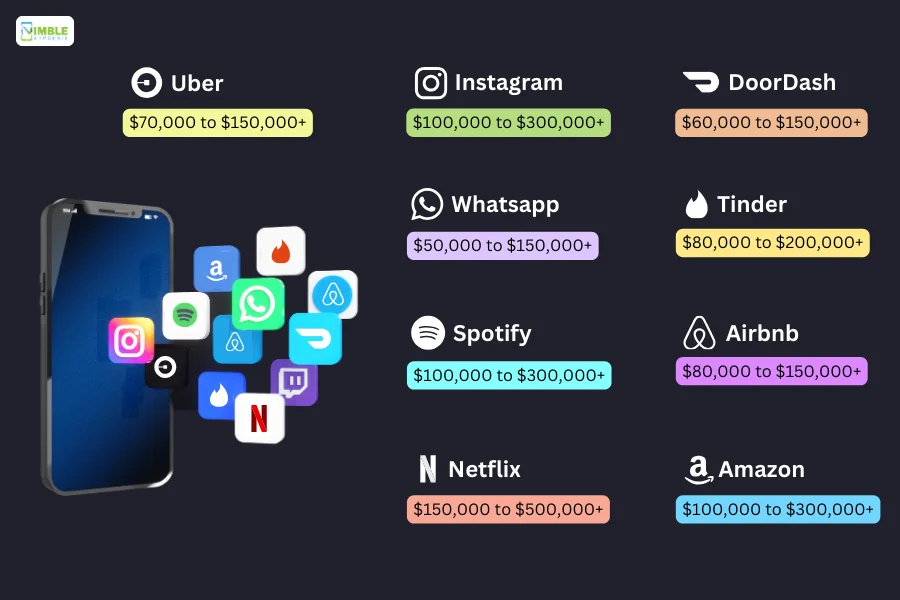
Here, we will look at top mobile app development cost examples. So with this being said, let’s get right into it:
1. Uber – $70,000 to $150,000+
Let’s start with one of the best, or shall we say, the best taxi booking app in the market.
Uber has inspired a lot of people to build a taxi booking app, being the force behind some of the biggest names in the market.
So, how much does it cost to build an app like Uber?
On average, taxi app development cost can range from $70,000 to $150,000 or more. Here, you will get basic real-time GPS tracking, ride booking, fare estimation, driver and user profiles, ratings, and payment integration.
2. Instagram – $100,000 to $300,000+
Social media app development has grown so popular recently with innovation across platforms. For instance, the change of skin for X, The new threads app, and whatnot.
This is why so many people want to build an app like Instagram or other top apps.
Now, if we are going with the basic features like photo uploads, filters, social networking, direct messaging, stories, and live streaming; the cost to build a social media app would be estimated to be between $100,000 and $300,000 or more.
3. WhatsApp – $50,000 to $150,000+
WhatsApp is one of the best chatting apps in around.
The cost to build a WhatsApp clone would range between $50,000 and $150,000 or more. Here, you will get features like text messaging, voice and video calls, media sharing, end-to-end encryption, and group chats.
If you want to build an app like WhatsApp that disrupts the market, you can go for some advanced features, but it will also add to the overall cost.
4. Tinder – $80,000 to $200,000+
Tinder is the OG in the dating market, inspiring thousands each year to build a dating app.
The cost to build an app like Tinder is estimated to be between $80,000 and $200,000 or more.
In the basic version, you get features like profile creation, geolocation, swipe mechanism, matchmaking, chat, and privacy settings. And when moving to the more advanced features like AI in dating apps, you will be looking at app development cost closer to $200,000.
5. Spotify – $100,000 to $300,000+
Want to create a music streaming app?
The cost to build a music streaming ranges $100,000 to $300,000 or more, making it by far one of the most expensive solutions on the list. Here, you get basic features like music streaming, playlist creation, search functionality, music recommendations, and social sharing.
6. Airbnb – $80,000 to $150,000+
The market is filled with apps like Airbnb, but the market is asking for more.
The app development cost is estimated to range from $80,000 to $150,000+. Here, you get features like property listings, a search with filters, a booking system, user profiles, reviews, and a secure payment gateway.
Now, if you want to build an app like Airbnb, that’s what you should be expecting to pay.
7. Netflix – $150,000 to $500,000+
So, how much does it cost to develop an app like Netflix? Well, if you are going for basic features like video streaming, user profiles, content discovery, recommendations, and multiple-device support.
Estimated Development Cost for this would range from $150,000 to $500,000+. With the rising popularity of video streaming apps, many want to create such an app.
8. Amazon – $100,000 to $300,000
Finally, we have come to Amazon, the OG of the eCommerce world.
The cost to develop an e-commerce app ranges between $100,000 & $300,000. Here, we are talking about the basic features of product listings, search and filter, shopping cart, user accounts, reviews, and payment processing.
As we move towards more advanced features, we are looking for a cost closer to $300,000 or more.
9. DoorDash – $60,000 to $150,000+
Lastly, let’s talk about developing a food delivery application.
The cost to build a food delivery app would range from $60,000 to $150,000 with features like restaurant listings, menu browsing, order placement, delivery tracking, and payment integration.
That’s the cost you pay if you want to build an app like DoorDash.
So, these are some of the most popular mobile apps and their app development cost. And with this out of the way, it’s time to look at the factors that affect the cost of building an app.
Factors That Affect App Development Cost
It is a fact, that app development cost depends on various factors. And if you want to successfully estimate the cost, you need to know these factors.
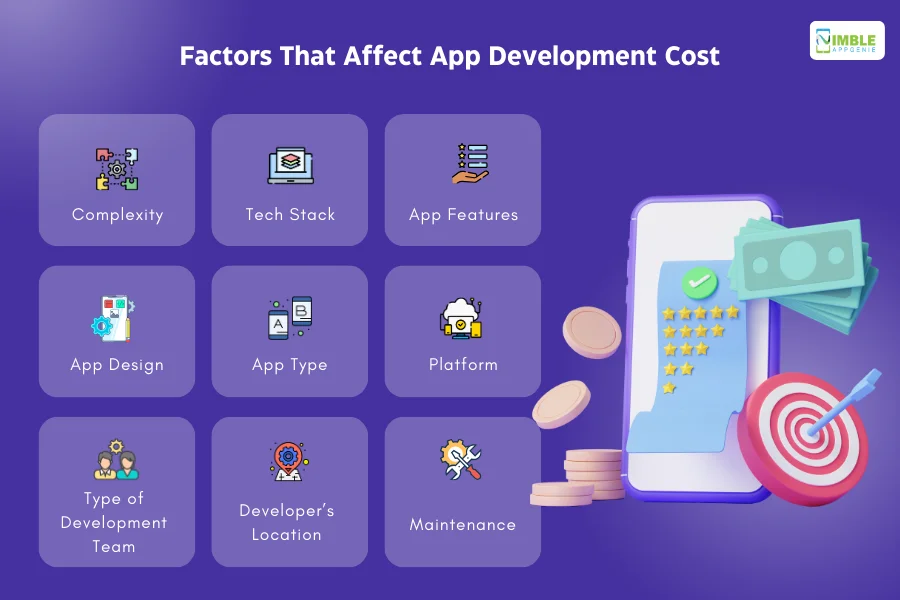
Now, this can be a bit confusing. To give you a better understanding of the same, we shall be looking at how these factors work in detail. So with this being said, let’s get right into it:
1. Complexity
The very first factor that we need to talk about is complexity.
As a general rule of thumb, the more complex a mobile application is, the more work it requires. Meaning, a larger team, more experienced developers on the team, and longer development time.
Consequently, as the complexity goes up, so does the cost to develop an app.
For instance, a simple mobile app development cost would be anywhere between $10,000 and $40,000. Moving on to the intermediate, mobile app development costs would be $40,000 to $80,000.
Furthermore, costs for high-complex app development projects would range from $80,000 to $150,000.
| App Complexity | Cost Range | Estimated Timeline | Features & Considerations |
| Simple | $10,000 – $40,000 | 1 – 3 months |
|
| Intermediate | $40,000 – $80,000 | 3 – 6 months |
|
| High Complexity | $80,000 – $150,000 | 6 – 12 months |
|
Complexity forms one of the base pillars if you are looking to estimate app development costs. Making it the first factor to consider when estimating cost.
2. App Features
Features and functionality are the building blocks of a mobile application regardless of its type. This fact makes the feature one of the largest factors in question.
Now, the features themselves can be divided into two different parts namely, basic features and advanced features. Each affecting cost in a different way.
Let’s start with the basic features and costs involved with them.
| Basic Features | Additional Cost Estimate |
| User Login | $2,000 – $5,000 |
| Simple Navigation | $1,000 – $3,000 |
| Profile Creation | $3,000 – $7,000 |
| Email Subscription | $1,000 – $2,500 |
| Social Media Feeds | $2,000 – $5,000 |
| Basic Analytics | $3,000 – $6,000 |
| Push Notifications | $3,000 – $8,000 |
Now, let’s move to advanced features and the cost associated with them in the table below.
| Advanced Features | Additional Cost Estimate |
| Custom UI/UX Design | $5,000 – $20,000 |
| Payment Integration | $10,000 – $25,000 |
| Real-Time Features | $10,000 – $35,000 |
| Complex API Integration | $10,000 – $30,000 |
| Advanced Security | $10,000 – $25,000 |
| Augmented Reality (AR) | $15,000 – $50,000 |
| Machine Learning | $20,000 – $60,000 |
3. App Type
Moving one step closer to figuring out “how much does an app cost to develop?”, it’s time to look at another big factor: app type.
There are various types of mobile applications and each one of them is unique enough to have a unique app development cost. Now, it isn’t possible to discuss each of them in detail, but here’s an overview:
| App Type | Cost Range | Estimated Development Time |
| On-Demand App | $40,000 – $80,000 | 4 – 6 months |
| eWallet App | $50,000 – $100,000 | 5 – 8 months |
| Insurance App | $60,000 – $100,000 | 6 – 9 months |
| Fitness App | $20,000 – $50,000 | 3 – 6 months |
| Dating App | $30,000 – $80,000 | 4 – 8 months |
| Social Media App | $50,000 – $150,000 | 6 – 12 months |
| Music Streaming App | $30,000 – $70,000 | 4 – 8 months |
| Video Streaming App | $50,000 – $150,000 | 6 – 12 months |
| Magazine & Newspaper App | $20,000 – $60,000 | 3 – 6 months |
| Fantasy App | $30,000 – $90,000 | 4 – 8 months |
| Political App | $20,000 – $50,000 | 3 – 6 months |
| Laundry App | $30,000 – $70,000 | 4 – 7 months |
| Taxi Booking App | $40,000 – $100,000 | 4 – 8 months |
| Beauty Salon App | $20,000 – $50,000 | 3 – 6 months |
| Fuel Delivery App | $40,000 – $90,000 | 4 – 8 months |
| Job Portal App | $30,000 – $70,000 | 4 – 7 months |
| Car Wash App | $20,000 – $50,000 | 3 – 6 months |
| Pet Grooming App | $20,000 – $50,000 | 3 – 6 months |
| Online Marketplace App | $40,000 – $100,000 | 4 – 8 months |
| E-Scooter App | $30,000 – $80,000 | 4 – 8 months |
| Food Delivery App | $40,000 – $100,000 | 4 – 8 months |
| House Cleaning App | $20,000 – $50,000 | 3 – 6 months |
The table clearly shows how the different types of mobile applications have different development cost. And now that we are done with this, let’s move to the next factor.
4. App Design
Mobile app design cost is yet another big factor to consider.
Without a UI/UX design, the app is as good as non-existent; after all, it’s half of the app. And speaking of design, it comes in all shapes and sizes.
A less complex and generic design may be a lot cheaper when compared to a more modern and aesthetically pleasing one. In addition to this, whether you are working on Android or iOS app design, also affects the overall cost to create an app.
Here’s a detailed overview of the app’s cost:
| Design Component | Cost Range |
| UI/UX Design | $5,000 – $20,000 |
| Logo and Branding | $1,000 – $5,000 |
| Custom Icons and Graphics | $2,000 – $10,000 |
| Wireframes and Prototypes | $1,000 – $5,000 |
| Animation and Transitions | $2,000 – $10,000 |
| User Testing | $2,000 – $10,000 |
Now that we are done with the app design and its contribution to the total cost to make an app, it’s time we move towards the next factor, which is….
5. Development Platform
When developing a mobile application, you need to choose a platform. As such, there are three options in total. For native app development, you have:
- iOS app development ($20,000 – $100,000)
- Android app development ($20,000 – $100,000)
Or opting for a cross-platform development ($20,000 – $100,000) approach significantly impacts your budget.
Native development offers optimal performance and user experience tailored to each platform but requires double the effort and cost. On the other hand, cross-platform development can be more cost-effective but might have trade-offs in performance and access to certain features.
So, let’s look at the detailed table:
| Platform Type | Cost Range | Estimated Development Time |
| PWA (Progressive Web App) Development Cost | $10,000 – $50,000 | 1 – 3 months |
| Web App Development Cost | $10,000 – $50,000 | 1 – 4 months |
| Android App Development Cost | $20,000 – $100,000 | 3 – 6 months |
| iOS App Development Cost | $20,000 – $100,000 | 3 – 6 months |
| Hybrid App Development Cost | $20,000 – $80,000 | 3 – 6 months |
| Cross-Platform App Development Cost | $20,000 – $100,000 | 3 – 6 months |
App development platform is arguably one of the biggest factors that affect the answer to “How much does it cost to create an app”. Speaking of which, let’s look at the next factor.
6. App’s Tech Stack
The mobile app tech stack is yet another great factor affecting how much it costs to build an application.
Native app development for each platform (iOS and Android) requires separate codebases, increasing development time and cost. Cross-platform frameworks like React Native offer a single codebase solution, potentially reducing development time and cost.
However, they might have limitations in terms of performance, access to native features, and customization.
Let’s look at an example of tech stack and related cost in the table below.
| Tech Stack Component | Options | Cost Implications |
| 1. Frontend (Mobile) | React Native, Flutter, Swift (iOS), Kotlin (Android) |
|
| 2. Backend | Node.js, Ruby on Rails, Python (Django/Flask) |
|
| 3. Database | MongoDB, PostgreSQL, Firebase |
|
| 4. Cloud Services | AWS, Google Cloud, Azure |
|
| 5. Development Tools | GitHub, Jira, Slack |
|
With the tech stack and its impact on “how much to create an app” done, let’s move to the next factor, which is…
7. Maintenance
When discussing mobile app development cost, we can’t forget the ongoing app maintenance and service costs of keeping your app afloat.
Regular bug fixes, feature updates, and server maintenance are crucial for a thriving app, and these expenses should be factored into your budget from the start.
Here’s a detailed breakdown.
| Maintenance Aspect | Cost Range |
| Bug Fixes | 10-20% of initial development cost/year |
| Hosting Fees | $10 – $10,000+/month |
| Licenses and Subscriptions | Variable |
| App Updates | 15-25% of initial development cost/year |
| Security Updates | 10-15% of initial development cost/year |
| Support and Customer Service | Variable |
8. Type Of Development Team
You can’t build an app without developers. So, it’s time to find an app developer and cost involved.
Now, there are various ways to do so. And your choice of development team significantly impacts cost.
In-house teams offer direct control over the project but come with hefty salaries, infrastructure expenses, and the need to manage recruitment and training. On the other hand, outsourcing provides flexibility and access to diverse skill sets but requires careful vetting for expertise, project management, and potential communication challenges.
People often compare in-house teams and outsourcing, so, let’s see how they compare.
| Hiring Method | Cost Range |
| In-House Team | $50,000 – $150,000+ per year per developer |
| Outsourcing | $20,000 – $100,000 per project |
| Staff Augmentation | $30,000 – $120,000 per year per developer |
Apart from the type of development team, the size and team members also affect how expensive it is to develop an app. Let’s see how:
| Role | Simple App Cost | Intermediate App Cost | Complex App Cost |
| Project Manager | $5,000 – $15,000 | $10,000 – $25,000 | $20,000 – $40,000 |
| UI/UX Designer | $3,000 – $8,000 | $8,000 – $20,000 | $15,000 – $30,000 |
| Mobile Developer (iOS/Android) | $5,000 – $20,000 | $20,000 – $50,000 | $30,000 – $70,000 |
| Backend Developer | $4,000 – $10,000 | $10,000 – $25,000 | $20,000 – $50,000 |
| QA Tester | $3,000 – $7,000 | $7,000 – $15,000 | $10,000 – $25,000 |
We aren’t done with the effect of developers and development teams of the app development finances, let’s look at another important factor below.
9. Developer’s Location
Well, we aren’t done with the cost of hiring developers. There’s yet another factor, the location, as Geographical location plays a role.
Hiring developers from regions with lower living costs, like Eastern Europe or Asia, can be more economical than hiring from countries with higher costs like the US or Western Europe.
However, consider factors like communication barriers, time zone differences, and potential cultural variances that might impact project efficiency.
| Location | Junior Developer | Mid-Level Developer | Senior Developer | |
| North America | USA | $50 – $80/hr | $80 – $120/hr | $120 – $180+/hr |
| Canada | $40 – $70/hr | $70 – $100/hr | $100 – $150+/hr | |
| Western Europe | UK | $40 – $60/hr | $60 – $90/hr | $90 – $130+/hr |
| Germany | $40 – $65/hr | $65 – $95/hr | $95 – $135+/hr | |
| Eastern Europe | Poland | $25 – $45/hr | $45 – $70/hr | $70 – $100+/hr |
| Ukraine | $20 – $40/hr | $40 – $65/hr | $65 – $95+/hr | |
| Asia | India | $10 – $25/hr | $25 – $50/hr | $50 – $80+/hr |
| Philippines | $10 – $20/hr | $20 – $40/hr | $40 – $70+/hr | |
| Latin America | Brazil | $20 – $35/hr | $35 – $50/hr | $50 – $80+/hr |
| Argentina | $20 – $35/hr | $35 – $55/hr | $55 – $85+/hr | |
| Australia | $40 – $70/hr | $70 – $100/hr | $100 – $150+/hr | |
And with this, we are done with all the major factors that affect the cost of app building.
Moving on, now it’s time to look at the other costs related to app development or what we call “hidden” app development cost.
Hidden App Development Cost Affecting Factors
Till now, we have discussed some of the major factors that affect how much it costs to develop a mobile application.
However, that’s not all.
It’s time to look at some “hidden” app development cost factors. This will give you an added perspective to the entire question of “how much does it cost to make an app?”
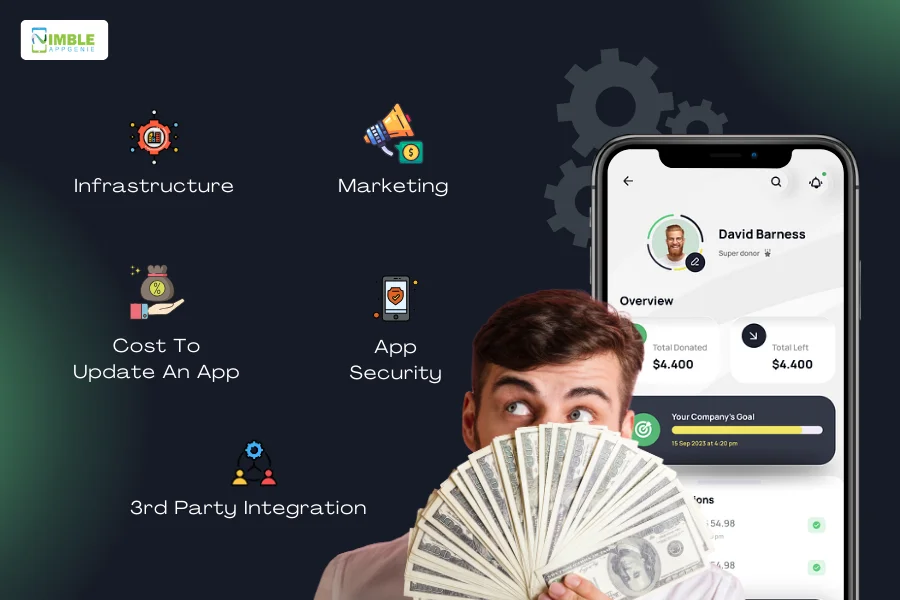
These are, as mentioned below:
1. Infrastructure
If you want to develop and run a mobile app, you need to have an Infrastructure.
This includes servers, databases, and development tools, which can significantly add to the overall costs, especially for complex apps requiring robust backend support.
Now, the exact cost will highly depend on your app’s requirements, so we can’t give a quote for it.
2. Marketing
App Marketing is crucial for app visibility and user acquisition.
The costs can vary widely based on the strategies employed, such as social media advertising, influencer partnerships, and app store optimization (ASO).
Effective marketing strategies are essential for the app’s success but can significantly increase the overall budget.
3. Securing an app
Mobile app security is super important.
Security measures, such as data encryption, secure data transmission, and compliance with regulations (e.g., GDPR, HIPAA), are essential to protect user data and prevent breaches.
These measures are critical but can add complexity and cost to the development process.
4. Cost to update an app
Regular updates are necessary to keep the app relevant, fix bugs, and introduce new features.
The cost of updates can vary based on their complexity and frequency but is an ongoing cost factor that needs to be budgeted for.
| Update Type | Potential Cost Range |
| Minor Updates | $1,000 – $10,000 |
| Major Updates | $10,000 – $50,000+ |
| OS Compatibility Updates | $2,000 – $20,000 |
| Security Updates | $5,000 – $25,000 |
5. 3rd Party Integration
Integrating third-party services, such as payment gateways, social media platforms, or analytics tools, can enhance app functionality but also add to the development costs due to API integrations and potential licensing fees.
| Third-Party Service | Potential Cost Range |
| Payment Gateways | $2,000 – $10,000 |
| Social Media Integration | $1,000 – $5,000 |
| Maps and Location Services | $2,000 – $10,000 |
| Analytics and Marketing | $500 – $3,000 |
| Cloud Storage and Databases | $1,000 – $7,000 |
| Messaging and Communication | $1,000 – $10,000 |
| Customer Support Tools | $500 – $4,000 |
| E-commerce and Marketplaces | $2,000 – $15,000 |
And those are the hidden factors involved in mobile application development cost. And with this out of the way, let’s move to the next section where we shall be looking at the development process and cost involved in each phase.
How To Estimate Mobile App Development Cost For Your Project?
Understanding the factors influencing mobile app development costs is crucial, but how do you translate that knowledge into an actual estimated cost for your specific project?
So, in this section of the mobile app development cost guide, it’s time to learn how to estimate app cost for your next project.
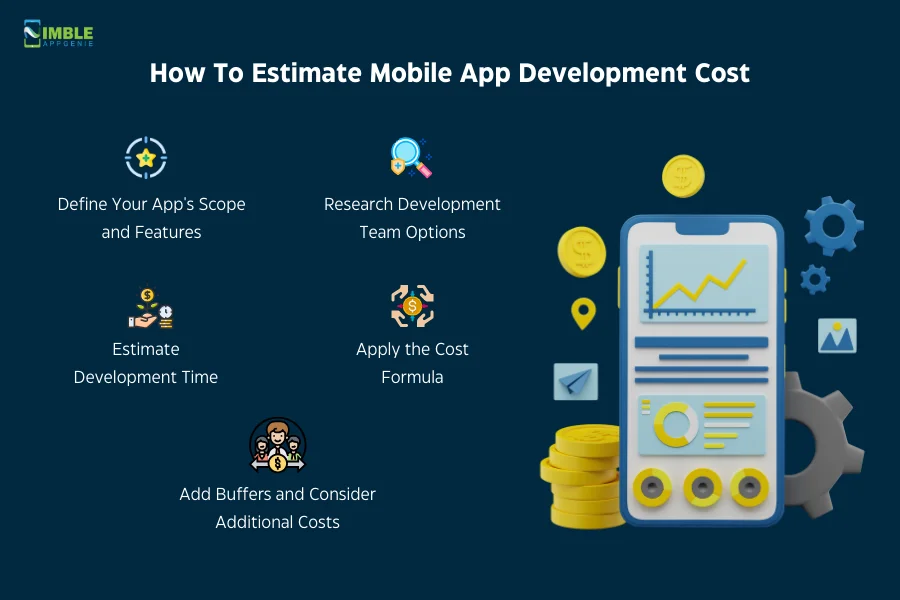
Here’s a step-by-step guide to help you navigate this process:
1. Define Your App’s Scope and Features
- Start with a clear vision: Outline your app’s core functionalities, target audience, and desired user experience.
- Prioritize features: Categorize features as essential, nice-to-have, and future enhancements. This helps prioritize development efforts and budget allocation.
- Create a user flow: Map out the user journey within the app, visualizing how users will interact with different features.
2. Research Development Team Options
- Consider your budget and project complexity: In-house teams offer control but are expensive. Freelancers can be cost-effective but require careful selection. Agencies provide expertise but might have higher fees.
- Research average developer rates: Based on your chosen development team location and their experience level, estimate the hourly or project-based cost.
3. Estimate Development Time
- Break down features into smaller tasks: Each feature can be further divided into smaller, more manageable development tasks.
- Research average development time per task: Based on industry benchmarks or consultations with experienced developers, estimate the time required to complete each task.
- Factor in complexity: Allocate additional time for complex features or integrations.
4. Apply the Cost Formula
Once you have the estimated development time and developer rates, you can use the following formula to calculate a rough estimate of your app development cost:
Estimated Cost = Development Time (hours) * Developer Rate (hourly/project rate)
5. Add Buffers and Consider Additional Costs
- Include a buffer of 10-20%: Unexpected challenges or scope changes can arise. Adding a buffer ensures you have some wiggle room in your budget.
- Factor in additional costs: Consider expenses like design, app store fees, server costs, and ongoing maintenance.
So, that’s how you answer the “how much does it cost to develop an app” question. And with this out of the way, it’s time to look at some tips to reduce your app development cost in the section below.
Steps To Reduce App Development Cost
As we saw in the blog, mobile app development cost can be expensive. However, building your dream app shouldn’t break the bank.
While development costs can vary significantly, implementing strategic measures can help you optimize your budget and achieve your vision without compromising quality.
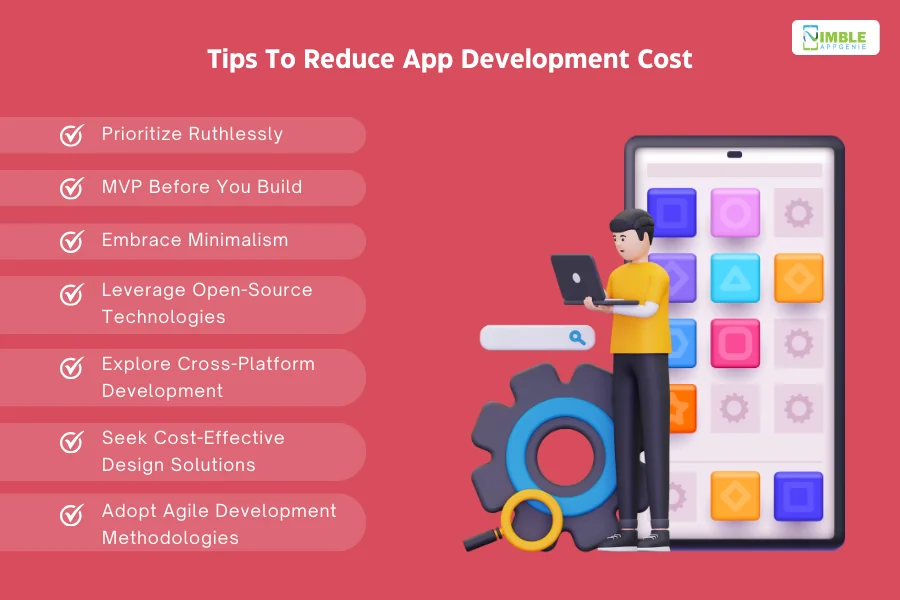
Here are some effective strategies to consider:
- Prioritize ruthlessly: Focus on core functionalities that deliver the essential value proposition of your app. Defer non-critical features for later iterations based on user feedback and market validation.
- MVP before you build: Invest in creating a clickable MVP development to validate your app’s concept and user experience before diving into full-fledged development.
- Embrace minimalism: Opt for a clean and intuitive design that prioritizes user experience without unnecessary animations or complex functionalities.
- Leverage open-source technologies: Utilize readily available open-source libraries and frameworks whenever possible.
- Explore cross-platform development: Consider developing a single codebase that can be deployed on both iOS and Android platforms.
- Adopt agile development methodologies: Break down app development into smaller, iterative sprints.
- Seek cost-effective design solutions: Consider utilizing pre-designed templates or collaborating with freelance designers for UI/UX development.
And that’s how you can reduce mobile application development cost. However, not that we are done with cost, it’s time to learn how to get some money back with monetization.
How To Get Good ROI, App Monetization Strategies
Developing a successful mobile app goes beyond just functionality and design. A crucial aspect lies in generating revenue and achieving a positive return on investment (ROI).
Here are some key mobile app monetization strategies to consider for effective revenue generation:
| Strategy | Description | Best suited for | Examples |
| Freemium Model | Offer a basic version for free with limited features, and premium features available through in-app purchases or subscriptions. | Apps with a large potential user base and valuable premium features. | Spotify, Candy Crush Saga, Dropbox |
| Paid Downloads | Charge a one-time upfront fee to download the app. | Niche apps with a targeted audience willing to pay for the full experience, utility apps with clear value proposition. | Minecraft, Monument Valley, ProCam |
| In-App Advertising | Integrate non-intrusive ads within the app, generating revenue based on impressions, clicks, or user actions. | Casual games, news apps, weather apps with high user engagement. | Angry Birds, Facebook, YouTube |
| In-App Purchases | Sell virtual goods, consumables, or additional content within the app using real money. | Gaming apps, productivity tools, and entertainment apps offer customization options or premium features. | Clash of Clans, Kindle, Headspace |
| Subscription Model | Provide access to exclusive content, features, or functionalities through a recurring subscription fee. | Apps offering ongoing value and continuous updates, content-driven apps like news or streaming services, and productivity tools with advanced features. | Netflix, Hulu, Adobe Creative Suite |
| Sponsorship and Partnerships | Collaborate with relevant brands or companies to integrate their sponsored content or features within the app. | Apps with a specific target audience are attractive to relevant brands, location-based services, and entertainment apps. | Waze, Pokemon Go, The New York Times |
| Data Monetization | Anonymize and aggregate user data for market research purposes, selling insights to interested businesses. | Apps collecting valuable user data with explicit consent, fitness trackers, and shopping apps. | Emerging strategy, success depends on ethical data practices and user privacy. |
Nimble AppGenie, Here To Help You Develop Affordable Apps
Do you want to develop a mobile app, but are worried about the cost? Worry no more; Nimble AppGenie is here to help you.
As a market-leading mobile app development company, we have the right skills and experience required to convert your idea into a working mobile application that makes an impact.
So, if you want to develop a mobile application that doesn’t burn a hole in your pocket, hire mobile app developers and get started.
Conclusion
On average mobile app development costs range from $10,000 to $150,000 based on factors like complexity, app platform, type, maintenance, developer’s location, and so on.
Now, there are various ways to estimate mobile app development costs, with the best one being consulting an app development firm like Nimble AppGenie.
So, if you want to learn more about the same contact us and start your own journey.
FAQ
The cost of developing a mobile app is influenced by several factors including app complexity, features, design, platform choice, tech stack, regular updates, and third-party integrations.
The average cost to develop a mobile app ranges from $10,000 to $150,000 or more, depending on the app’s complexity, features, and other influencing factors.
Here’s how application of differing complexity affect development cost:
- Simple apps: $10,000-$40,000
- Intermediate apps: $40,000-$80,000
- High-complexity apps: $80,000-$150,000
Additional costs include maintenance (10-20% of the initial development cost/year), hosting fees and licenses (15-25% of the initial cost/year), and security updates (10-15% of the initial cost/year).
Consulting an app development company is recommended for an accurate mobile app development cost estimation based on specific project requirements.
An app development budget template includes planning & research, app design, app development (frontend and backend), third-party integrations, testing & quality assurance, deployment, marketing & launch, maintenance & updates, legal & administrative costs, and miscellaneous expenses.
Some of the app development cost example are, as mentioned below:
- Uber: $70,000 to $150,000+
- Instagram: $100,000 to $300,000+
- WhatsApp: $50,000 to $150,000+
- Tinder: $80,000 to $200,000+
- Spotify: $100,000 to $300,000+
- Airbnb: $80,000 to $150,000+
- Netflix: $150,000 to $500,000+
- Amazon: $100,000 to $300,000
- DoorDash: $60,000 to $150,000
App features can significantly impact development costs, with basic features like user login and simple navigation costing less, while advanced features like custom UI/UX design and real-time functionalities add significantly to the cost.
The choice of platform (PWA, web app, Android, iOS, hybrid, cross-platform) affects development costs, with costs varying based on the platform’s specific requirements and development complexities.
The tech stack, including frontend, backend, database, cloud services, and development tools, influences the development costs based on the selected technologies and their associated costs.
Maintenance costs include bug fixes, hosting fees, licenses and subscriptions, app updates, security updates, and support and customer service, which can range significantly based on the app’s complexity and requirements.
The cost of app development is affected by the type of development team, with options including in-house teams, outsourcing, and staff augmentation, each offering different cost structures and benefits.
Yes, the developer’s location can significantly affect app development costs, with rates varying based on the region’s economy, demand for tech talent, and the cost of living.

Udai Singh is a senior content writer with over 6 years of experience in creating content for FinTech, eWallet, EdTech, and App Development. He is an expert in simplifying complex concepts and creating engaging content that resonates with the audience.
Table of Contents




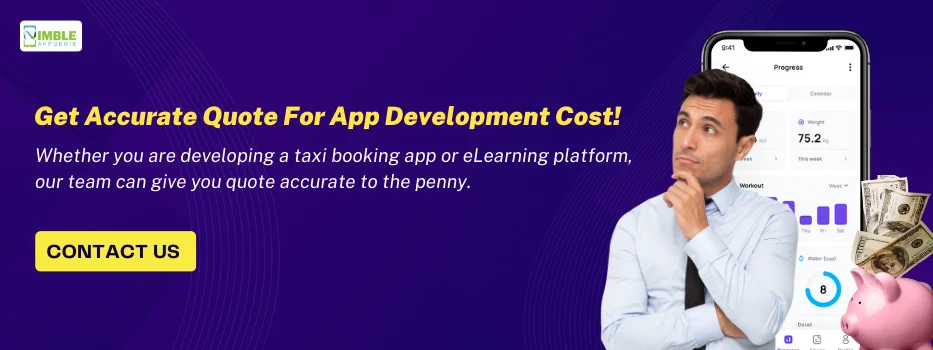
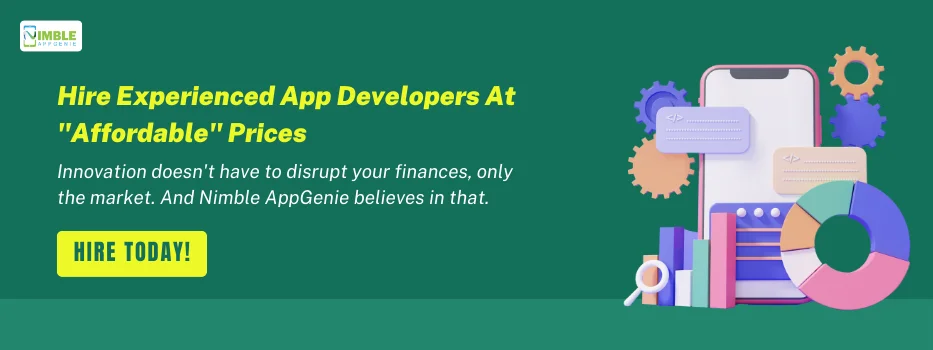
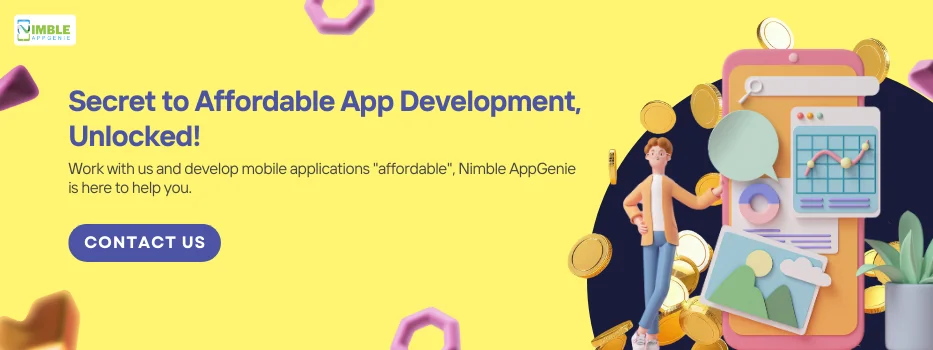





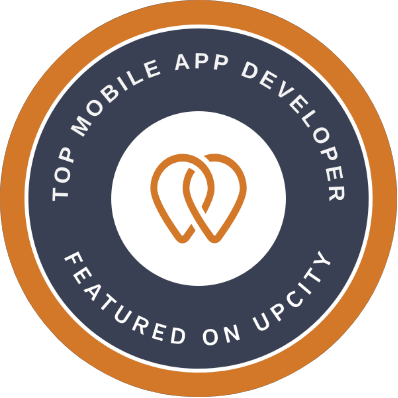
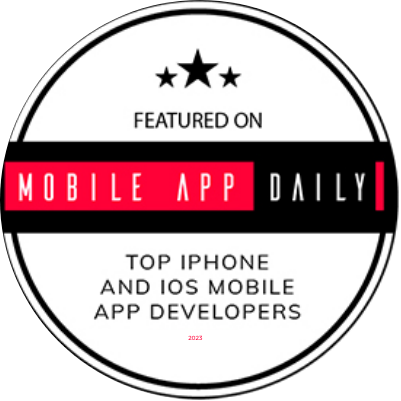
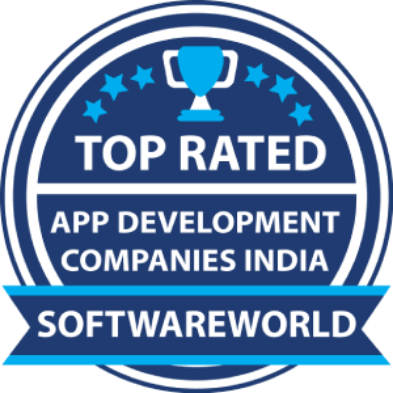
No Comments
Comments are closed.